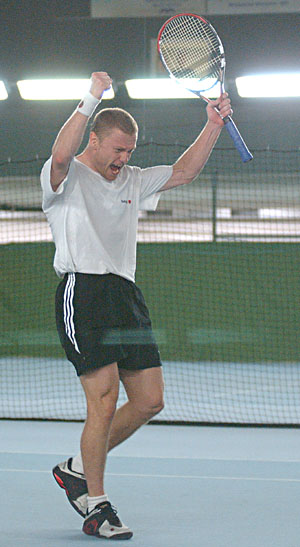
Magnus Eliasson, World No.1 at every compilation of the ranking since its introduction three years ago (with one single exception in October 2005).
No reasonable ranking system would have worked differently.
World Ranking System Review
2006-02-15
_________________
In connection with the recent appointment of a new IRF Ranking Officer (at the Council meeting in Vienna a few months ago) a review of the present ranking system will be undertaken and all members of the growing racketlon community are hereby invited to give their views - positive as well as negative. See ranking officer Phil Reid's message below.
The present ranking system has been around since March 2003 (see newsitem from its introduction) and new versions have been released as of the last day of every tour event since the first IRF Racketlon World Tour was launched with Swedish Open in January 2003, as can be seen on this page, where all these versions are still available. Some people feel that the system represents something unique in the world of sports (what other sport maintains a world ranking that covers everyone from international elite down to beginner level?) and that it is a major factor explaining the recent racketlon take-off after over a decade of Scandinavian obscurity.
The principles of the system have basically remained the same ever since its introduction. Given constraints of administrative resources as well as the general uncertainties of the time (Was the tour at all going to prove itself in practice? Would people actually start to travel around or would the tour events be mainly local?) the main idea behind the system was to keep things simple. Simple for the administrator of the system. And simple in the sense that really sophisticated mechanisms should be avoided (since uncertainties were so big anyway it would have been a waist to introduce them).
So, the fundamental principle became the simplest imaginable; "one match victory=one point". And since matches tend to become more difficult to win the further one gets in a knock-out draw, victories in quarter-finals, semi-finals and finals are better rewarded (2, 3 and 5 points respectively).
But the standard of different draws can be very different and the winner of a Class C draw should obviously not be given as many ranking points as the winner of an Elite draw. The present ranking system addresses this issue by means of the "Class Factor", which is multiplied with the "base" points described above to give the actual ranking points. The idea of the Class Factor is that it should reflect the standard of the draw. The higher the standard of the draw, the more difficult it will be to win a match and hence the bigger the Class Factor. In practice, this has so-far been simplified to 100, 10 and 1 (for Elite, Class B and Class C respectively).
The Base Points and the Class Factor are the two basic principles of the system and players on the tour have long got used to the idea that winning a match in the Elite Class gives 100 ranking points, whereas winning a match in the Class C only gives 1 ranking point. That could probably never get any simpler. To make the system complete, however, it was necessary to introduce two other factors that come into play as time goes by; those of Erosion and Quality. The Erosion Factor made sure that recent results carry more weight than older ones and that really old results (older than 3 years) do not count at all; and the Quality Factor made sure that "busy players" travelling to a lot of tournaments are not excessively rewarded (only the top 3 results are counted in full). That's about it. The present ranking system does not really have any other major features. (But see this page for all the details.)
What do you think? Does the present ranking system still do a good job or would you like to see some major changes? Would you like us to stay with this simple winning concept or is it about time that the system got more sophisticated? Our new ranking officer invites you to contribute;
_________________
Hello Everyone,
As Ranking Officer for the International Racketlon Federation I
have been asked to review the current Racketlon ranking system
and subsequently make recommendations to the Council in June
(World Championships Meeting). To carry out this important task I
require the support of the Racketlon community and therefore ask
for any individuals interested in contributing to this process to
please send me an email ( phil.reid @ racketlon.com ) and confirm
your willingness to participate in the process.
Our timescales are quite tight and a draft project plan (with
delivery dates) has been prepared. I therefore need any/all
expressions of interest by 22nd February 2006 at the very latest.
I should also point out that an 'expression of interest' commits
you to nothing, but simply allows me to explain the project plan,
the different levels of involvement and to outline the
contribution you can make.
So far 3 volunteers have stepped forward .... but we are very
keen to expand this group.
If you feel you have something to contribute and wish to help
influence the future direction of the Racketlon ranking system
..... please email me and 'express your interest'.
I look forward to hearing from you soon.
Regards,
Phil Reid
Ranking Officer
International Racketlon Federation

Magnus Eliasson, World No.1 at every compilation of the
ranking since its introduction three years ago (with one single
exception in October 2005).
No reasonable ranking system would have worked differently.
_________________________________